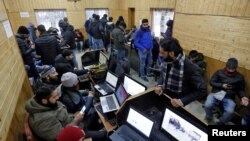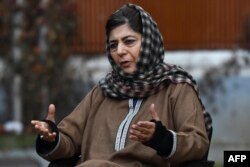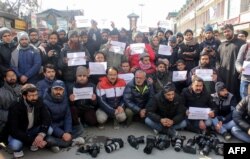Independent media in Kashmir and Jammu are "slowly being choked" by restrictions, the Press Council of India says.
In a report based on interviews with more than 60 journalists, activists, and media owners late last year, the Press Council of India called on authorities in the Indian-controlled region to address a series of troubling trends.
The report cites arbitrary arrests, restrictions on access, withholding of state advertising revenue, threat of eviction from government-owned property, and the closure of the Kashmir Press Club.
"Journalists function with a high level of stress and are constantly facing pressure both from the government agencies and police as well as militants. That they still manage to do their job in such a hostile environment, itself is commendable," said the report, released in March.
Many in the industry believe media are "slowly but surely being choked," the report added.
Gurbir Singh, a journalist at The New Indian Express, is one of three Press Council members involved in the report.
It "fervently appeals to the government of Jammu and Kashmir to open up lines of communication with the press corps in [the region] and facilitate free and unbiased news coverage," he told VOA.
The focus on conditions for Kashmir media came after Mehbooba Mufti, co-founder of the Jammu and Kashmir People's Democratic Party and a former chief minister, contacted the Press Council to raise concerns over harassment of the media.
However, some journalists interviewed by the Press Council noted that media also reported retaliatory measures for critical reporting when Mufti was chief minister.
The Jammu and Kashmir Department of Information and Public Relations did not respond to VOA's emails requesting comments.
Threat of arrest
One of the main concerns cited in the report is the number of journalists called in for police questioning or asked to complete documents that request details including property, assets, political affiliations and names of relatives in Pakistan.
"As many as 49 journalists have been arrested and charged since 2016," the report says.
At least eight were detained under the Unlawful Activities (Prevention) Act (UAPA). The anti-terror legislation allows authorities to detain a suspect for lengthy periods with little chance of bail.
One of cases cited is that of Fahad Shah, editor of the news website Kashmir Walla.
Shah was summoned for questioning and then arrested for publishing "anti-national content" on February 4 over a report on a gunfight in south Kashmir.
Authorities have since brought additional charges against Shah under the Public Safety Act (PSA), his lawyer and colleague told VOA. According to Human Rights Watch, the draconian 1978 law permits detentions without trial for up to two years—including sedition, public mischief and "misguiding common masses by circulating fake news against the government and its policies."
The arrest brings a constant sense of uncertainty, assistant editor at The Kashmir Walla, Yashraj Sharma, told VOA.
The newsroom has been through an emotional rollercoaster with Shah arrested and released on bail twice before being charged a third time under the PSA, Sharma said. "The situation has only gotten more challenging for everyone, including Fahad's family."
Umair Ronga, a lawyer representing Shah, told VOA the accusations are baseless. He believes the PSA charge was added to "prolong his [Shah's] custody."
Pamela Philipose, public editor at Indian news website The Wire, says that among the Press Council's recommendations, "The most important to my mind is the demand that 'intimidation, arrests and detention under draconian laws should stop.'"
"The multiple arrests of Fahad Shah in the same case indicates the state's determination to silence at all costs the media for doing its job," she told VOA.
Withholding revenue
The reliance by media on government advertising revenue and in some cases government-provided office space or accommodation are also cited in the report.
Several editors and publishers said state advertising used a "carrot-and-stick strategy to discourage critical news coverage."
Advertising was suspended at 26 of the 259 outlets in Jammu and 17 out of 166 outlets in Kashmir, according to data from the region's Information Department, which is cited in the report.
While the government dropped nine publications for poor print quality, other news outlets described in the report as "anti-establishment" were dropped without explanation, the Press Council said.
The allocation of advertising appeared "directly proportional to the extent of support a publication renders to the government's schemes and policies," the report said. "This flies in the face of a 'free media' guaranteed by the Indian Constitution."
A number of reporters in the Srinagar Press Enclave — housing provided by the government — were also served eviction notices. In some cases, the government cited rent defaults but in other cases, no reason was provided.
"It is difficult to judge government action," one journalist told the Press Council, before noting that half of the 40 eviction notices went to those in media.
Security flagged
Authorities often cite national security concerns for the restrictions and regulations on media. Jammu and Kashmir has been afflicted by clashes and militancy for decades.
The Press Council acknowledged the challenges such an environment presents but said journalists should not be penalized or harassed for their coverage.
"News and views may not be always palatable to those who are in power. But it does not mean that they [should] penalize the messenger," the report said, adding that a journalist is not "the spokesperson of the government."
Geeta Seshu, from the Free Speech Collective, an Indian free expression group, says the report "brings to the fore the deep mistrust of the state administration toward an independent media."
Seshu was doubtful if recommendations on government funding and accommodation would be acted on, saying, "It remains to be seen if these will be accepted and adhered to."
A Srinagar journalist who requested anonymity to protect his security, told VOA that fear of arrest or harassment affects the ability of media to work.
"Not only have bylines of Kashmir-based reporters fallen massively, their social media activity is also a reflection of the success [of] ... intimidation and fear tactics," the journalist said. "Considered one of the pillars of a working democracy, the press in Kashmir, without an exaggeration, is breathing its last remaining breaths."







